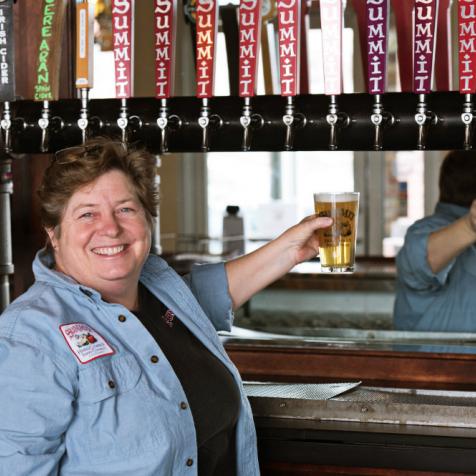
Summit Hard Cider & Perry Company
By John Garvey | Mar 06, 2018
Company Details
Location
Fort Collins, Colorado
Founded
2012
Ownership Type
Private
Employees
14
Products
Hard cider
Founder Jennifer Seiwald is introducing innovative flavors to the dynamic cider market.
Don't order cider for your kids at an English restaurant. What's known as "hard cider" in the U.S. is just cider elsewhere -- a semantic hangover from Prohibition which still confuses Yankees.
"I still have people come in and not understand that it is alcoholic cider," says Seiwald. "And also that on the other side of the pond, it is a male-dominated drink, whereas over on this side of the pond, people think of it as a primarily female-based drink. And both of those are wrong."
In her five-plus years running an urban cidery, Seiwald has more than doubled the size of her taproom, Scrumpy's Hard Cider Bar & Pub, quintupled production, acquired a second cider brand, and launched a mobile juicing operation.

Summit's two main flagship ciders include Della's Apple Strudel (named after Seiwald's grandmother) and Blueberry Lavender. "I think that people enjoy it because it's unlike anything out there in the marketplace," Seiwald remarks about the latter. "It's a beautiful color in the glass and the aroma, by adding the lavender in there, makes it even more unusual. But it's still really approachable and most of the time we're able to use Colorado culinary lavender."
What are ideal gateway ciders for wine and beer drinkers? There's no specific "best" match, but Seiwald warns people against their preconceptions. "We try to give people permission to like sweet ciders because cider is made from fruit, so it's okay to be sweet," she says. "Everybody always thinks they're supposed to drink dry white wines, but what's really interesting is one of the largest growing portions of the alcoholic beverage market is sweet wines and sweeter ciders."

Seiwald calls Della's "a really safe place to start, or it's kind of fun sometimes to start them with Campfire which is the one that's infused with spruce tips and a little bit of Douglas fir. It's gonna be on the drier side but it has an interesting fruity kind of citrusy peachy nose so that even though it's a dry cider people are like 'This isn't what I was expecting!'"
According to Seiwald, a lot of new entrants are getting raw materials from the same suppliers, making the cider market more homogenous. Summit's mobile juicer helps with access to more unique, local and heirloom apples.
Local sourcing and sustainability are objectives Seiwald repeatedly comes back to, though she notes that sourcing apples from in-state is more aspirational. Her goal is to source 30 percent of all fruit from within Colorado on average, although the climate here makes that a moving target. Events like hail and early freezes can wipe out more than 90 percent of the commercial apple crop in the Front Range, she points out. That makes sourcing a huge challenge, year after year.

A lot of cider apples favored by other producers don't grow well in Colorado due to climate and soil conditions. For instance, quintessential British cider apples prefer a wetter climate, less alkaline soil and less snow.
A little over seven months ago, Summit partnered with a bottling operation in nearby Windsor that has catapulted it into over 60 local liquor stores. They're experimenting with different styles and bottle sizes. Summit's three most popular flavors are available in 12-ounce four packs.
Additionally, Scrumpy's just began offering an international flight featuring ciders from Spain, England and France. Seiwald plans to more than double the size of Summit's 90-barrel fermentation system in 2018, adding two or three more tanks. The cidery began with two seven-barrel tanks.

Leftover mash is composted or used for livestock feed for pigs, llamas, and other animals. "They consider it a huge treat," remarks Seiwald. "In fact, there's a couple places that I take it out to and the animals chase me down the driveway in the truck to the point of I'm almost afraid to get out of the truck."
Challenges: Space, says Seiwald. "The biggest asset we have is being in the downtown, Old Town location. The biggest detriment we have is being in a downtown, Old Town location. Because as we participate in growing of apples or pressing apples or processing the raw fruit, that takes up a lot of equipment and that equipment takes up a lot of space."
She adds, "I haven't been able to put a car in my garage since we opened and I don't think I'll be able to get a car in my garage probably ever again in my lifetime. And then not having a loading dock or a lot of room for expansion. But we definitely wouldn't trade one for the other."

Opportunities: "Using Colorado fruit," says Seiwald. "The mobile juicing trailer was part of the Local Foods Promotion Grant from the USDA and we were awarded that last year and we couldn't be more excited to finally have it. . . . [W]e're also looking forward to being able to share that juice with other cideries, other distilleries, other breweries so that they can use more of Colorado agriculture's realm. So it's a win-win-win."
Part of the intent of the Local Foods Promotion Program is to reduce waste and allow farmers to profit from product that's difficult to bring to market. A massive amount of produce gets thrown away because it doesn't match the desired grocery store aesthetic. Notes Seiwald: "Janky-looking fruit makes beautiful juice."
Needs: "Space, time, and great fruit," says Seiwald.

